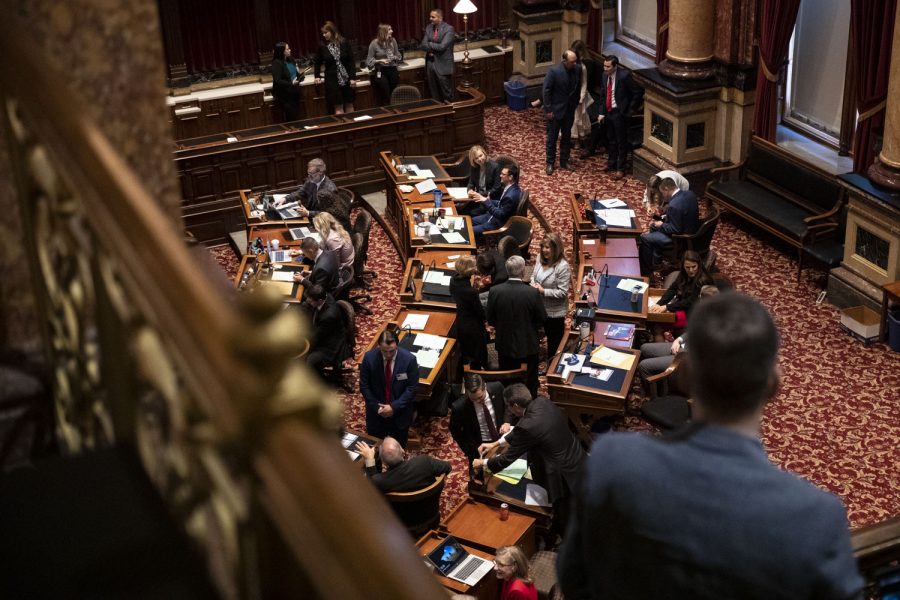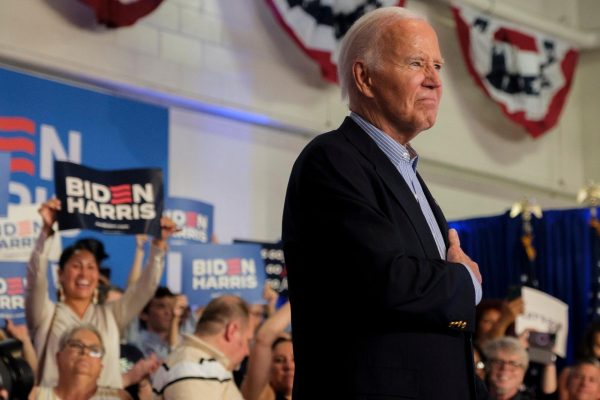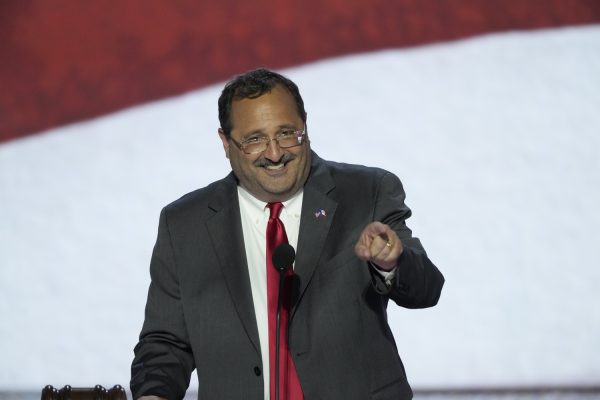Iowa legislators prioritize young Iowans in 2022
During the 2022 Iowa legislative session, lawmakers want to focus on ways to attract young people to the state as population growth only hits Iowa’s largest cities.
Members of the Senate congregate in the Senate Chamber during the opening of the 2022 Legislative Session at the Iowa State Capitol in Des Moines, Iowa, on Monday, Jan. 10, 2022. Both the House and Senate Republican leaders said the priority of this session is to return tax funds and address workforce conditions.
February 6, 2022
Republican and Democratic lawmakers in Iowa agree that young people need more incentives to decide to settle down in the state.
At the beginning of the 2022 legislative session, legislative leaders said they wanted to convince more young people to stay in the state as Iowa’s population ages and young, college-educated adults set out for other locales.
Senate Minority Leader Zach Wahls, D-Coralville, said that some of the biggest areas of focus for retaining and attracting new Iowans include affordable housing, child care, and water quality. These are things, he said, that Iowans are asking for.
“Outdoor recreation is incredibly important to millennials and Gen Z folks and making sure that we are making the necessary investments to have clean rivers and lakes is really important to people, so that people are able to get out on the water with their family and have a good time,” Wahls said.
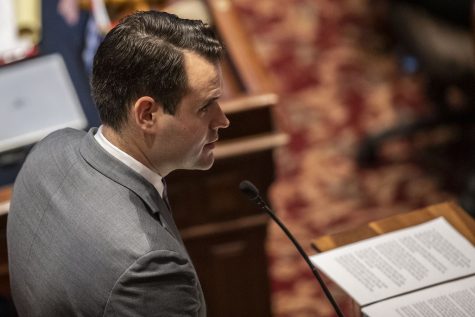
Wahls said the workforce shortage, which has also been a discussion on both sides of the aisle in the Statehouse, contributes to why young people continue to move to different states.
There are two sides to Iowa’s workforce issues, Wahls said. The first is that there are staffing shortages in every industry across the state, while many Iowans who work these jobs struggle to support their families.
Raising wages, Wahls said, will attract new residents and retain current Iowans. Iowa’s minimum wage has been $7.25, the federal minimum wage, since 2009.
“We can’t do that until we start getting after some of these issues that we talked about like child care and affordable housing,” Wahls said.
Wahls and other Democrats have attempted to pin the blame for Iowa’s workforce woes on Republican Gov. Kim Reynolds, dubbing it the “Reynolds workforce crisis.”
Cambrian Helm, a third-year criminology major at the University of Iowa, said she plans to move back to Illinois following graduation. She said the two biggest factors she considers when finding a place to live are a solid job and housing market.
Because of what she sees as the economic climate that her generation is graduating in, Helm said most of the people in her graduating class will be unable to buy a house. She said this is one priority legislators should focus on.
“If you’ve been out of school for a while you have a steady job,” Helm said. “You have enough money to afford a house. But a lot of us don’t. So that’s really going to impact whether we stay or go depending on where we can afford to live.”
Wahls said that offering affordable housing to Iowans, especially in an era where people are working remotely, will grow the state’s economy and population as graduates can work anywhere.
Democrats and Republicans agree that Iowa’s workforce needs to be addressed if they want to welcome people to the state.
Rep. Bobby Kaufmann, R-Wilton, said that Iowa’s population shift has been a conversation for years, but those conversations are just now coming to fruition. He said this is partly because of the workforce shortage.
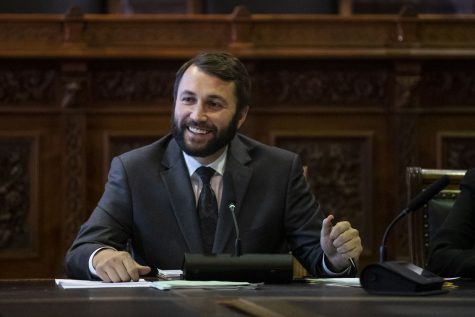
Psychology is a field that Iowa lacks as well as one that young people tend to be interested in pursuing, Kaufmann said.
House File 2137, introduced in January, would create a mental health practitioner loan repayment system to help students who want to study psychology pay for their schooling. The bill says that in order to receive funding, the student must practice in Iowa following graduation.
Kaufmann said this bill will encourage young Iowans to stay in the state.
RELATED: Iowa Gov. Kim Reynolds to end coronavirus public health proclamation
“I think picking up professions where there’s a high level of competition, where there’s a high level of need, and then strategically as a state investing in people’s education and saying, ‘Hey, we’re gonna help you pay for it, if you stay.’ I think people’s wallets will speak,” Kaufmann said.
Adriana Davila, a University of Iowa freshman who grew up in the state, said she plans to move out of Iowa following graduation to find new opportunities and connections.
Most of the places Davila hopes to go to after graduation have high tax rates, and she said it would be much easier to live somewhere with low taxes.
“It’s a big deal that those places just happen to have really high taxes, just because they’re like cities, like bigger. So that’s a big deal and concerns me,” Davila said.
Kaufmann said a competitive tax rate will attract young people to the state.
”Knowing that you’re going to be able to keep a pretty decent chunk of your paycheck for your family, I think is a pretty strong consideration,” Kaufmann said.
Iowa Gov. Kim Reynolds unveiled her tax reform plan last week, detailing how the state will set the income tax at a flat 4 percent by 2026, a significant cut for most Iowans.
RELATED: Leaders call for tax cuts, workforce solutions, in opening of 2022 legislative session
In her Condition of the State address in January, Reynolds said making Iowa’s tax rates more competitive will bring people to the state.
“They’ll come because here they can find freedom and opportunity,” she said. “Because of our small towns and thriving cities. They’ll come because we reward work, value personal responsibility, and care for our neighbors.”
Sauvik Goswami, assistant director of assessment and analytics at the UI Pomerantz Career Center, said most students who leave the state cite reasons such as career, family, education, and weather. Family and career were also reasons why students chose to stay in Iowa, along with affordability.
In a survey of 2,791 employed graduates from the 2019 and 2020 classes, 1,421 reported staying in Iowa.
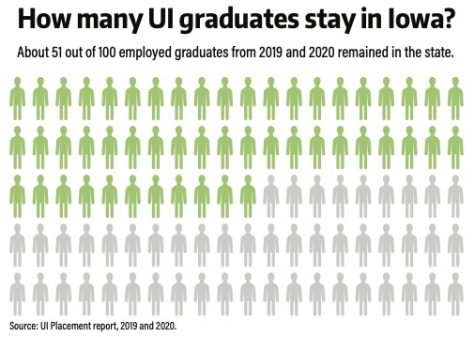
Davila said legislators should focus on climate change in order to attract young people to the state.
Wahls said Iowa leads the nation in renewable energy, specifically electricity generated per capita.
In 2020, MidAmerican Energy supplied 83.6 percent of Iowa customers with renewable sources with their prices being the eleventh lowest in the country. Over half of the state’s electricity generation has come from renewable energy — mostly wind.
While Iowa is ahead of the curve, Wahls said, the state needs to make changes to its farming and agricultural practices.
Wahls said finding new uses for ethanol beyond powering cars is important, as Iowa is a major contributor to corn and ethanol production.
“I think we’re just going to continue to see more [research and development] done on those best practices for farmers that can reduce the carbon footprint in ways that are not as invasive as people might be worried about,” Wahls said.
House Minority Leader Rep. Jennifer Konfrst said legislators have learned a lot from young Iowans and about what is important to them — climate change, student debt, and college affordability.
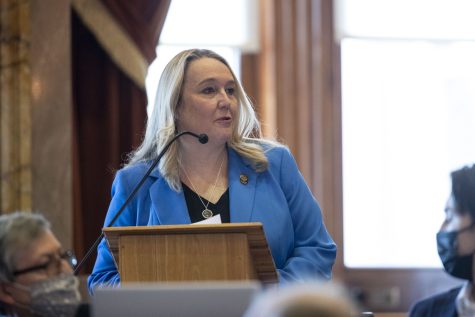
Konfrst said that keeping the priorities of young people in mind could not only attract them to the state, but also help elected officials learn more.
“We’re not recent grads, so we don’t always know exactly what it’s like out there. If we didn’t have your perspectives, we wouldn’t know to make these things priorities. And we are making them priorities,” Konfrst said.
The bills that the House and Senate are passing, Konfrst said, are not bills that are sending a welcoming message to those who might want to move to Iowa, she said.
“When we’re focused on being exclusionary with our legislation or lashing out at the LGBTQ community, we’re not making Iowa a welcoming state,” Konfrst said. “We need to sell our state to people who are graduating and remind them that we’re a place that welcomes everyone.”
Konfrst said affordable housing is high on her list of priorities as well as investment in arts and culture.
There is bipartisan support for some ways of incentivizing young people to come to Iowa, Konfrst said. Both parties agree that child care and housing should be more affordable, she said, but few legislative moves have been made to make them a reality.
Iowa’s overall population rose by 5.3 percent, between 2010 and 2020, but population growth only occurred in 33 of Iowa’s 99 counties, while population decreased in the other counties. The counties where population grew the most were Dallas, with 53.6 percent growth, Johnson, with 16.3 percent, and Polk, with 15.9 percent.
The population shrank in most rural counties in the state. Wahls said that more focus needs to be had on small towns as they continue to shrink.
Having a good economic policy for midsize towns, Wahls said, is one way to invest in small communities where families travel for recreational activities. Supporting these communities will keep younger Iowans coming through, he said.
“Iowa’s always going to have hundreds of small towns, and the small town way of life is worth protecting and fighting for because there’s so many people who love and cherish their small town communities,” Wahls said.
Wahls said investing in the state’s public education will further incentivize young people to want to settle down in Iowa.
House and Senate Democrats proposed a plan to boost public school funding in Iowa by 2.25 percent — an increase of $300 million.
“There is a competing vision for the future of our state right now, one that really taps back into the roots that gave Iowa the nickname ‘The Education State,’” Wahls said.
Kaufmann said that he has spoken to Iowans who moved away from the state but plan to come because of the freedoms that the state offers.
Iowa’s stance on COVID-19 restrictions and 2nd amendment rights has an impact on whether people stay or leave, Kaufmann said.
“I realized that if you’re somebody who has liberal leanings, you want to move because you don’t like some of that stuff. I do get that,” Kaufmann said.
Kaufmann said it’s important for young people to stay in the state because they build families which increase the population, they bring new energy to their communities, and they bring a lifetime of spending.
“If you’re a young couple that’s just getting ready to buy your first house and have your first couple kids, and you stay here for the next 50 years, that’s huge for whatever community you decide to locate in,” Kaufmann said.



